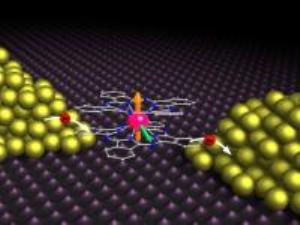Quantum computers are capable of achieving processing speeds much greater than current generation of computers. Though they employ quantum mechanisms, quantum computers will still be susceptible to external influences.
 The TbPc2 molecule quantum-bit device (Credit: C. Grupe, KIT)
The TbPc2 molecule quantum-bit device (Credit: C. Grupe, KIT)
In any memory-based or information processing device, the inflow and outflow of information is a crucial process and reading out the information in a quantum bit has to be done in a controlled manner without disrupting stability of the quantum state. Researchers from KIT in conjunction with partners Strasbourg and Grenoble have succeeded in devising such a method of reading an atomic quantum state by employing electrodes.
The researchers’ solution is derived from magnetic molecule complexes. These comprise metal atoms characterized by magnetic moments and a spin at the centre. The atom is protected by a surrounding enclosure of organic molecules. It is possible to control the level of exposure of the metal atom to external influence by the design of the molecular shield.
The team used the metal atom terbium for their study and employed an enclosure consisting of 100 nitrogen, carbon and water atoms. The enclosed atom was placed amidst gold electrodes of nanometer scale. By virtue of the molecule properties, the electrodes behaved like the three channels of a transistor in which the voltage of the middle electrode influences the current flowing through the other two electrodes. The amplitude of the current through the electrodes reflected the molecular spin jumps when exposed to different intensities of magnetic field. The current flow measured indicated that the stability of the metal atom lasts for 20 s. This duration of stability is considered to be good enough for quantum processes.
The study results hold significance for spintronics apart from quantum computing.